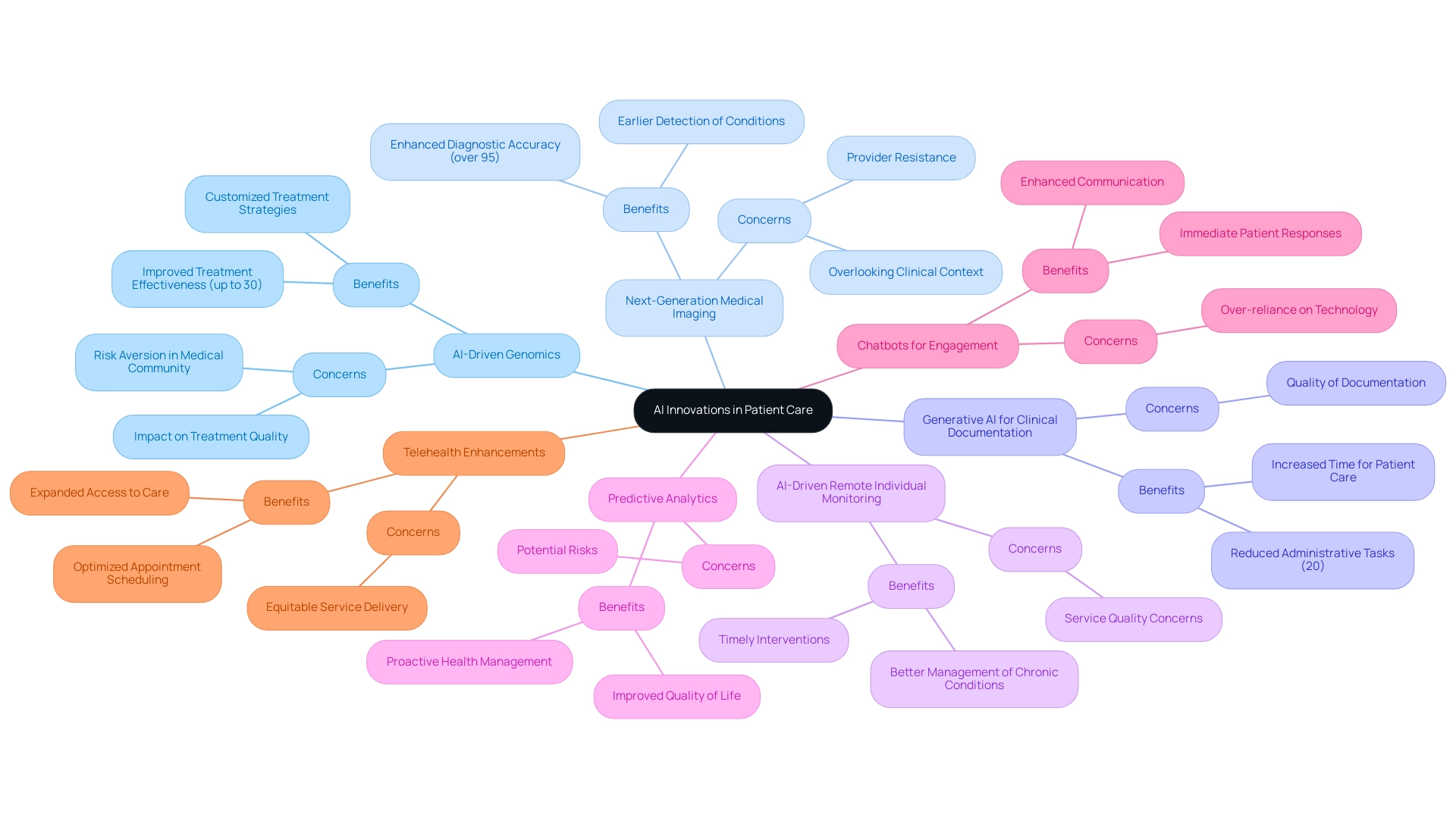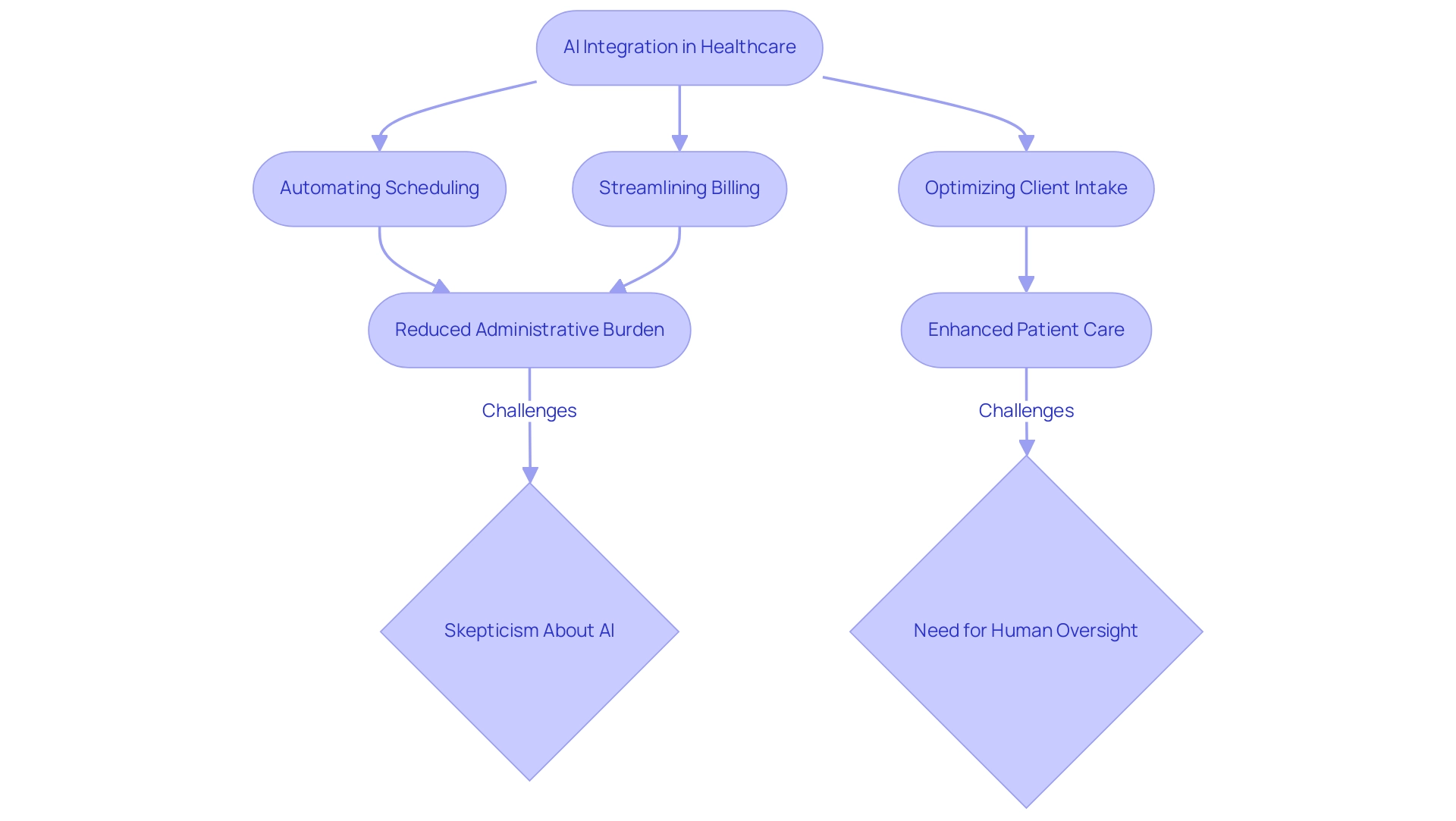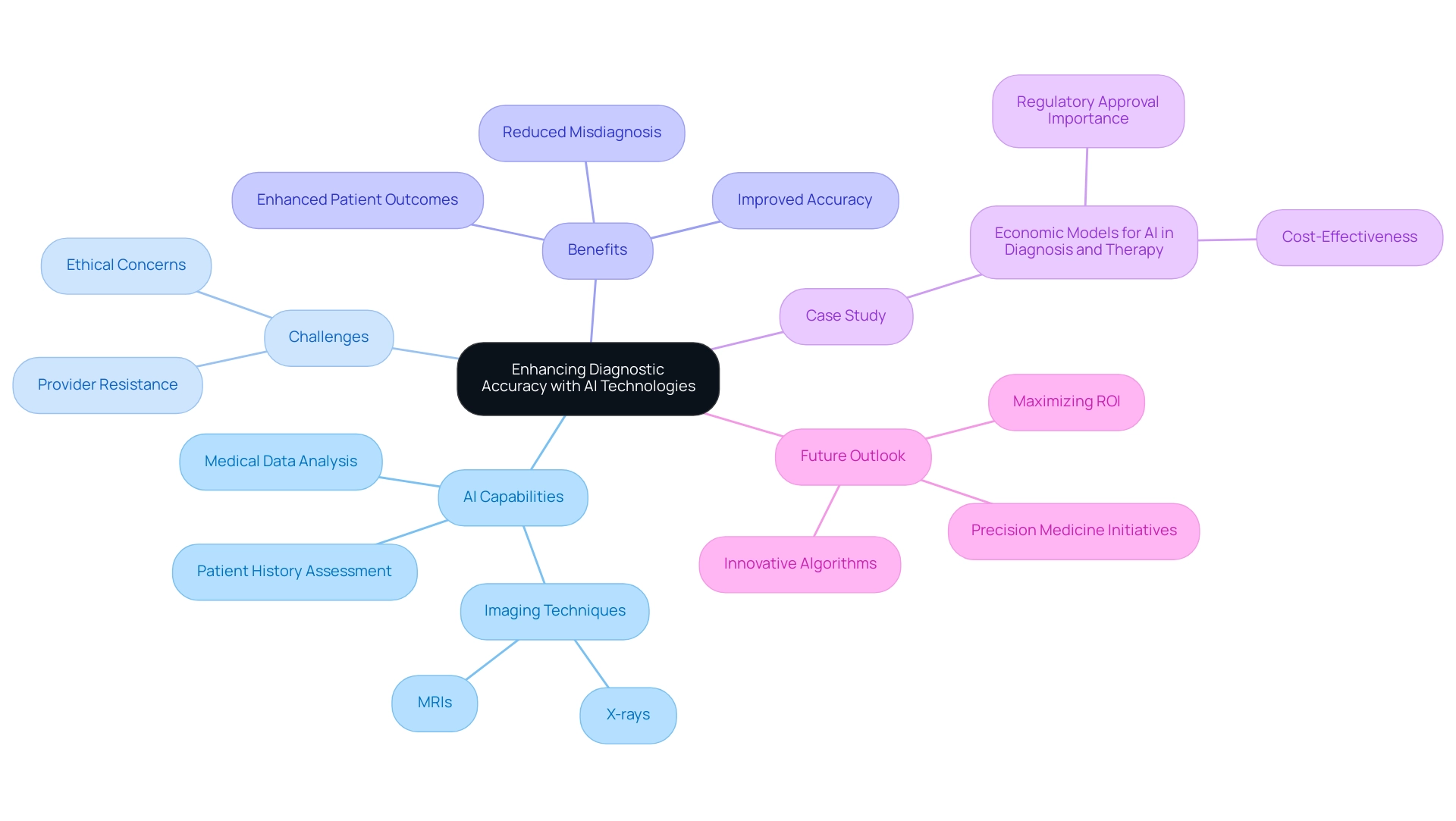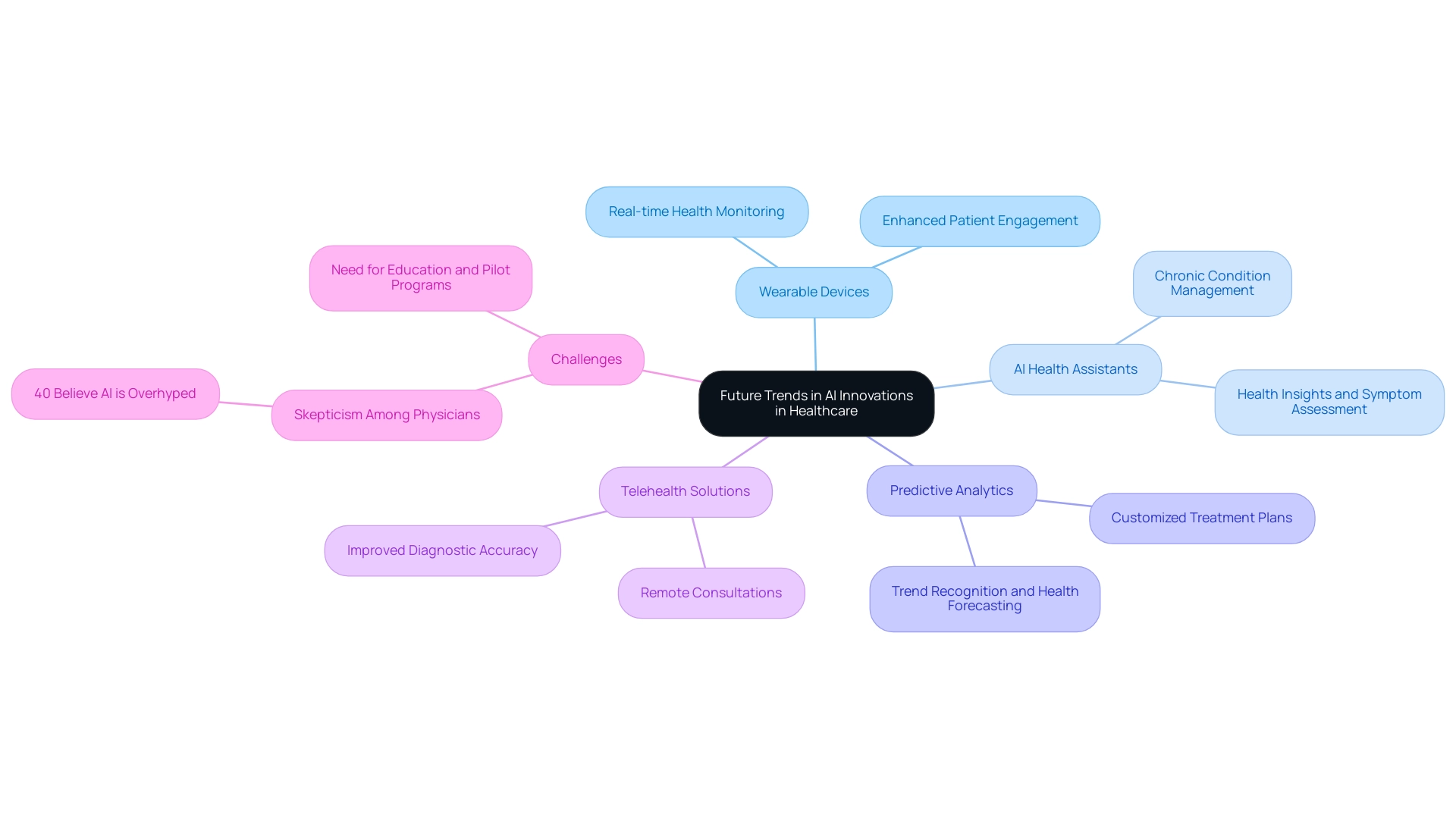Overview
In the evolving landscape of healthcare, providers often face emotional challenges that can impact their ability to deliver the best care. The article highlights seven groundbreaking AI innovations that are not only transforming healthcare but also addressing these pressing concerns. These advancements, including AI-driven genomics, medical imaging, and telehealth enhancements, aim to improve patient care and operational efficiency.
How can we alleviate the burdens that healthcare professionals carry? By detailing how these technologies enable personalized treatments and enhance diagnostic accuracy, we can see a clearer path forward. Moreover, they streamline administrative tasks, allowing providers to focus more on their patients and less on paperwork.
The benefits are profound: a more effective and compassionate healthcare system emerges, one that prioritizes patient needs while supporting the dedicated professionals behind the scenes. As we explore these innovations, let’s reflect on how they can reshape our approach to healthcare, fostering a nurturing environment for both patients and providers alike.
Join us in this journey toward a brighter future in healthcare, where technology and compassion go hand in hand.
Introduction
In the rapidly evolving landscape of healthcare, the integration of Artificial Intelligence (AI) emerges not merely as a trend but as a transformative force. This force is reshaping patient care, enhancing operational efficiency, and improving the overall healthcare experience. Have you ever felt overwhelmed by administrative tasks that take time away from patient interactions? AI technologies are here to help, automating these burdens and paving the way for a more personalized and efficient healthcare system.
As medical professionals increasingly recognize the potential of AI, it’s essential to address the challenges that accompany this innovation. Trust, ethical considerations, and the need for robust frameworks are paramount. How can we navigate these complexities together? This article delves into the multifaceted role of AI in modern healthcare, exploring groundbreaking innovations that promise to redefine the patient-provider relationship.
By understanding these trends, we can work towards improved outcomes and a more compassionate approach to care. Let’s embark on this journey together, embracing the potential of AI to support us in delivering the highest quality of care to our patients.
Understanding the Role of AI in Modern Healthcare
Artificial Intelligence (AI) is fundamentally transforming the medical landscape, offering a helping hand in automating administrative processes, enhancing diagnostic accuracy, and significantly boosting individual engagement. Recent advancements in AI technologies, especially in machine learning and natural language processing, empower providers to analyze extensive datasets, enabling swift and informed decisions. This integration not only streamlines operations but also elevates the quality of care provided to patients, ensuring their needs are prioritized in every aspect of service delivery.
As we approach 2025, the role of AI in modern healthcare becomes increasingly critical. A staggering 91% of physicians express the necessity for assurance that generative AI materials are crafted by medical experts before they can confidently incorporate them into clinical decision-making. This highlights the essential nature of trust and expertise in the adoption of AI technologies.
Moreover, the influence of AI on treatment quality is profound. By automating routine tasks, healthcare providers can reclaim valuable time, allowing them to focus on direct interactions with individuals. This shift not only enhances operational efficiency but also fosters a more compassionate care environment, aligning with the ethical standards upheld by faith-focused providers.
Additionally, AI algorithms can analyze large datasets to identify genetic markers and biomarkers associated with specific diseases or treatment responses. This information assists physicians in customizing treatments for individual patients, maximizing effectiveness and minimizing adverse effects, ultimately leading to enhanced outcomes.
The transformative potential of personalized medicine represents a significant advancement in AI solutions, allowing for targeted therapies that can drastically improve patient outcomes while reducing the stress on physicians by streamlining treatment decisions. Recent data indicates that 40% of executives believe advanced AI solutions are excessively costly, illustrating the financial concerns surrounding AI in the medical field. Furthermore, 68% of non-users are from Generation X or Baby Boomers, providing demographic context to the discussion on AI adoption.
Case studies illustrate the current state of AI adoption in healthcare organizations across the U.S. While progress has been made, challenges remain, particularly concerning risk management and the need for improved infrastructure. The case study titled 'AI Adoption in Healthcare Organizations' emphasizes these challenges and the limited uptake of AI solutions despite their potential advantages.
Nonetheless, organizations utilizing AI advancements report improved interactions and satisfaction, showcasing the tangible benefits of AI solutions.
Current statistics indicate that the global AI chip revenue is projected to reach $83.25 billion by 2027, underscoring the growing investment in AI technologies within the medical field. As medical providers navigate this evolving landscape, the incorporation of AI will continue to play a crucial role in shaping the future of treatment and operational efficiency, ultimately leading to a brighter future for medical delivery.
Seven Groundbreaking AI Innovations Reshaping Patient Care
- AI-Driven Genomics: The integration of AI algorithms in genomics is transforming precision medicine, allowing for the analysis of vast genetic datasets. This capability empowers medical providers to develop customized treatment strategies tailored to individual profiles, significantly enhancing outcomes for patients. Recent research indicates that AI applications in genomics can improve treatment effectiveness by up to 30%, showcasing their potential to reshape healthcare. However, many medical practitioners remain cautious about these innovations, concerned about their impact on treatment quality and the inherent risk aversion within the medical community.
- Next-Generation Medical Imaging: AI technologies are enhancing the accuracy of medical imaging diagnostics. By utilizing advanced algorithms, AI can facilitate earlier detection of critical conditions like cancer, which is essential for effective treatment. Current advancements in AI imaging accuracy have demonstrated notable improvements, with some systems achieving diagnostic precision rates exceeding 95% in clinical settings. Despite these strides, resistance from medical providers remains, as they often worry that reliance on AI may overlook the broader clinical context, as highlighted by experts in the field.
- Generative AI for Clinical Documentation: The automation of clinical documentation through generative AI is alleviating the administrative burdens that medical providers face. By streamlining the process of creating clinical notes, AI enables clinicians to reclaim valuable time that can be redirected towards patient care. Reports suggest that the implementation of AI in documentation has reduced administrative tasks by about 20%, improving overall efficiency in medical environments. This efficiency is crucial in addressing the concerns of medical professionals who prioritize patient interactions over paperwork.
- AI-Driven Remote Individual Monitoring: Continuous monitoring powered by AI technologies is facilitating timely interventions and better management of chronic conditions. These systems leverage real-time information to alert medical professionals of any significant changes in a patient's health, enabling proactive strategies that can lead to improved outcomes. This approach directly addresses physicians' concerns about service quality, allowing for prompt responses to individual needs and mitigating the risk-averse tendencies that often hinder the adoption of new technologies, including AI applications.
- Predictive Analytics: AI's ability to analyze extensive individual data sets allows for the prediction of health outcomes, empowering providers to implement proactive strategies. This predictive capability is particularly advantageous in managing chronic diseases, where early intervention can significantly influence treatment trajectories and enhance quality of life. By addressing medical professionals' fears regarding potential risks, predictive analytics can illustrate how AI solutions enhance safety and service quality, ultimately supporting startups in overcoming barriers to innovation.
- Chatbots for Engagement: AI-powered chatbots are improving engagement by providing immediate responses to inquiries, thereby enhancing communication between patients and medical providers. These tools not only simplify the patient experience but also enable staff to focus on more complex needs, addressing the administrative challenges that often deter providers from embracing new technologies.
- Telehealth Enhancements: The integration of AI in telehealth services is revolutionizing access to care. By optimizing appointment scheduling and follow-ups, AI ensures a more efficient telehealth experience, allowing individuals to receive prompt assistance regardless of their location. This innovation is particularly vital in expanding access to medical services for underserved populations, helping to alleviate some of the concerns from providers about equitable service delivery.
- Case Studies on AI Tools: Approximately 10% of medical professionals are currently utilizing AI-powered tools like Med-PaLM2 or ChatGPT to enhance diagnostic and treatment planning effectiveness. This underscores AI's growing role in improving medical practice and patient interaction, aligning with CosmaNeura's mission to support care providers in delivering ethical and effective treatment. These case studies illustrate how overcoming initial hesitations can lead to significant improvements in patient outcomes and operational efficiency.

Ethical Frameworks for Responsible AI Use in Medicine
Incorporating AI in medical services requires a strong ethical structure that prioritizes safety, privacy, and informed consent. Central to this framework are key principles such as:
- Transparency in AI algorithms
- Accountability for AI-driven decisions
- Equitable access to AI technologies
At CosmaNeura, we understand that as healthcare organizations increasingly implement AI solutions, they must create guidelines that promote responsible use, addressing potential biases in data and ensuring that AI systems enhance, rather than replace, the human element in care.
Our commitment to alleviating burdens on physicians is at the forefront of our mission. We strive to empower them with innovative AI solutions that enhance their capacity to provide quality care.
Transparency in AI algorithms is particularly crucial, as it directly impacts trust among individuals. When people understand how AI systems function and make decisions, they are more likely to engage with these technologies. This trust is vital, especially considering recent findings suggesting that 9% of psychiatrists believe AI could offer empathetic support, highlighting the potential for AI to improve patient interactions when implemented responsibly.
Moreover, cultivating a culture of ethical AI use can significantly enhance outcomes. By ensuring that AI technologies support medical providers rather than replace them, organizations can help alleviate clinician burnout—a pressing issue exacerbated by increasing demands on medical systems. Case studies have shown that AI can relieve administrative pressures, allowing medical staff to devote more time to providing direct individual support, ultimately enhancing the quality of care delivered.
For instance, the case study titled "Reducing Clinician Burnout through AI Cures" illustrates how AI can ease the administrative burden on medical professionals, enabling them to focus on interactions with individuals and improve service quality.
As we approach 2025, the emphasis on ethical frameworks for AI in medical services will only intensify. Statistics reveal that a significant majority of business owners recognize the benefits of AI, with 97% believing that tools like ChatGPT can enhance customer interactions and streamline processes. This sentiment underscores the importance of integrating ethical considerations into AI development and implementation, ensuring that advancements in medical services not only drive innovation but also uphold the highest standards of care, in alignment with CosmaNeura's guiding principles.
Our diverse experiences shape our approach to medical advancements, empowering us to create solutions that genuinely meet the needs of medical providers and individuals alike.
Boosting Efficiency: How AI Streamlines Healthcare Operations
AI technologies are transforming medical operations by automating essential tasks such as scheduling, billing, and client intake. This automation significantly alleviates the administrative burden on service providers, allowing them to dedicate more time to direct patient care. Have you ever considered how AI-driven systems can analyze individual data to optimize appointment scheduling? This ensures that resources are utilized efficiently and effectively, ultimately benefiting both providers and patients.
Looking ahead to 2025, statistics indicate a significant increase in AI automation within healthcare operations, particularly in the adoption of AI tools for administrative tasks. These advancements not only streamline workflows but also enhance the overall experience for individuals navigating the healthcare system. Moreover, AI plays a crucial role in billing processes by suggesting accurate codes based on patient interactions, minimizing errors and maximizing revenue potential.
Yet, the integration of AI in medical services does come with challenges. A comprehensive analysis of various research reports reveals that many medical professionals and consumers express skepticism regarding AI's reliability. Concerns about misdiagnosis, transparency, and data accuracy underscore the necessity for human oversight in AI applications. It’s important to address these fears to foster trust and acceptance.
The case study titled "Barriers to AI in Healthcare" emphasizes these challenges, indicating that skepticism remains a significant hurdle for broader AI adoption, particularly among risk-averse doctors who prioritize patient care quality. How can we overcome these barriers and ensure a smoother transition to AI integration?
Despite these concerns, the potential benefits of AI in reducing administrative burdens are substantial. The increasing demand for robust AI governance frameworks, which have surged by 7000% over the past five years, highlights the growing recognition of the need for oversight in AI applications. This shift indicates that medical providers are beginning to understand how AI can be safely integrated into their practices.
Expert opinions emphasize that "AI is here to stay, and its use cases will only increase as the technology becomes more sophisticated." This sentiment reinforces the argument about the permanence and growing relevance of AI in medical care. The incorporation of AI not only enhances operational processes but also fosters a more empathetic and productive medical environment, ultimately improving service delivery.
CosmaNeura's platform exemplifies this transformation by focusing on administrative efficiency and adherence to Catholic teachings. This ensures that providers can deliver care that aligns with their values while addressing the concerns of their patients.
In summary, embracing AI in healthcare can lead to a more compassionate and efficient system. Let’s continue to explore how these technologies can support our mission to provide the best possible care for our patients.

Enhancing Diagnostic Accuracy with AI Technologies
AI advancements are truly transforming diagnostic precision, revealing how AI can meticulously analyze complex medical data and uncover patterns that may elude human clinicians. With advanced algorithms now capable of processing medical images—such as X-rays and MRIs—with remarkable accuracy, we are witnessing earlier and more precise diagnoses of critical conditions, including tumors and fractures. Recent studies show that AI can significantly reduce misdiagnosis rates, a persistent challenge in healthcare, often exacerbated by the resistance to innovation among providers.
This resistance frequently stems from valid concerns about maintaining the quality of care and patient interactions, which can hinder the adoption of new technologies. However, it’s essential to recognize that embracing AI can enhance, rather than compromise, the care provided.
Moreover, AI's capabilities extend beyond imaging; it plays a vital role in assessing patient histories and lab results. By synthesizing this information, AI equips medical providers with actionable insights that can enhance treatment decisions. The integration of AI in diagnostic processes not only improves accuracy but also fosters better patient outcomes, ultimately contributing to a more efficient medical system.
A case study titled "Economic Models for AI in Diagnosis and Therapy" highlights the cost-effectiveness of AI in medical care. It emphasizes the importance of comprehensive cost-benefit analyses that can help overcome initial resistance to these transformative technologies.
As we look toward 2025, the impact of AI on diagnostic accuracy is expected to expand, with innovative algorithms continuously being refined to enhance medical imaging analysis and support precision medicine initiatives. Furthermore, implementing AI can maximize return on investment (ROI) for organizations, reinforcing the case for its adoption in the medical field. CosmaNeura, the sole company providing AI solutions tailored for the faith-oriented medical sector, exemplifies how these innovations can elevate service quality while adhering to ethical standards.
As Shuroug A. Alowais notes, the ethical considerations and regulatory aspects of AI in healthcare are crucial. It is vital to ensure that AI is utilized responsibly and effectively to transform healthcare delivery and enhance patient-centered care. How can we work together to embrace these advancements for the benefit of all?

Transforming Patient Experience through AI-Driven Engagement
AI-driven engagement tools are transforming the experience of individuals by providing personalized interactions and support tailored to specific needs. For instance, AI chatbots play a crucial role in assisting individuals in managing their health by answering queries, scheduling appointments, and sending medication reminders. These tools not only streamline administrative tasks but also foster a more engaging medical environment.
In 2025, the integration of AI in healthcare engagement is expected to significantly enhance satisfaction rates. Statistics indicate that 91% of physicians express a need for assurance that generative AI materials are developed by medical professionals before they can be confidently utilized in clinical decisions. This highlights the importance of trust in AI applications within healthcare, especially in addressing the resistance to innovation that many healthcare providers encounter.
CostaNera is committed to ethical practices and adherence to Catholic teachings, ensuring that our AI solutions address these critical concerns.
Moreover, AI's ability to analyze individual data allows for the customization of communication and care plans, ensuring that each individual receives the attention they deserve. This personalized approach not only enhances satisfaction but also encourages adherence to treatment plans, ultimately resulting in improved health outcomes thanks to AI innovations.
Case studies demonstrate that medical leaders are prioritizing technological advancements, such as AI-driven engagement tools, to enhance access and operational efficiency. By concentrating on these innovations, practices can bolster security, modernize operations, and improve patient engagement, leading to a more effective delivery system. CosmaNeura's AI solutions are designed to address these priorities, ensuring that providers can deliver compassionate care while optimizing their operations.
As Chris Harrop, Managing Editor of MGMA Connection magazine, notes, "The growing focus on AI tools reflects a continued trend of cautious but increasing adoption of these technologies." This sentiment underscores the potential of CosmaNeura's AI-driven engagement tools to transform patient experiences through personalized interactions, paving the way for a brighter future in medical services that embodies the compassionate spirit of Catholic care.
Future Trends: The Next Wave of AI Innovations in Healthcare
Several key trends in AI innovations are reshaping the future of medical services, particularly with the introduction of AI cures. Imagine a world where healthcare is more accessible and personalized. A significant development is the integration of AI with wearable devices, which enables real-time health monitoring. This synergy not only empowers individuals to track their health metrics but also allows healthcare providers to receive continuous data, enhancing decision-making and engagement through AI cures.
For instance, AI health assistants are becoming indispensable tools for managing chronic conditions. Can you see how these AI cures are relied upon by a majority of digital health users for health insights and symptom assessment? Moreover, these AI tools are improving diagnostic accuracy and lab test interpretation, showcasing how AI cures lead to a better understanding of medical data and enhance safety.
However, skepticism exists within the medical community; a statistic reveals that 40% of physicians believe AI is overhyped and will not meet high expectations. This highlights the need for hospital leaders to educate their teams about AI opportunities and invest in pilot programs for digital transformation. Addressing these concerns is crucial for healthcare startups aiming to engage doctors effectively and overcome resistance to innovation.
The challenge frequently starts when technology sales discussions with doctors result in worries about the quality of service and interactions, which can establish obstacles to adoption. How can we bridge this gap?
Advancements in predictive analytics are also paving the way for AI cures through the development of customized treatment plans. By examining extensive volumes of data from individuals, AI cures can recognize trends and forecast health outcomes. This enables personalized interventions that enhance treatment. Furthermore, the use of AI cures is revolutionizing clinical documentation processes, significantly reducing the time healthcare professionals spend on administrative tasks.
According to industry insights, generative AI and automation could potentially reduce by half the time revenue cycle staff allocate to routine tasks. Imagine the impact this could have, allowing nurses to dedicate 20% more time to direct client support.
The emergence of AI cures through telehealth solutions is another trend that promises to enhance access to services, especially in underserved regions. These innovations not only facilitate remote consultations but also enhance the quality of care through improved diagnostic accuracy and lab test interpretation. As AI tools keep advancing, the development of AI cures will further improve the efficiency, precision, and customization of medical services, ultimately resulting in better outcomes for individuals.
Looking forward to 2025, the combination of AI cures with wearable technologies is anticipated to have a significant effect on health monitoring. This integration will not only improve patient safety but also foster a deeper understanding of medical data among patients, thereby enhancing their engagement in their own health management. As these innovations develop, AI cures will undoubtedly play a crucial role in transforming the medical landscape for a brighter tomorrow.
Notably, CosmaNeura stands out as the only company creating AI solutions specifically for the faith-focused medical sector, aligning its mission with these transformative trends. However, it is essential to recognize that traditional accelerators are often not equipped to support healthcare startups in navigating these challenges. It is imperative for startups to seek tailored support and resources. How can we ensure that these innovative solutions reach those who need them most?

Conclusion
The integration of Artificial Intelligence (AI) in healthcare represents not just a technological advancement; it embodies a paradigm shift that holds the promise of enhancing patient care, streamlining operations, and redefining the provider-patient relationship. Innovations such as AI-driven genomics, predictive analytics, and remote patient monitoring are already transforming how healthcare providers deliver services. These changes lead to improved patient outcomes and increased operational efficiency. By automating administrative tasks and enhancing diagnostic accuracy, AI enables healthcare professionals to devote more time to direct patient interactions, fostering a more compassionate care environment.
Yet, the journey towards embracing AI is not without its challenges. Trust, ethical considerations, and the need for robust frameworks are crucial in ensuring that AI technologies are used responsibly and effectively. As various case studies illustrate, addressing concerns about data accuracy and maintaining the human touch in care are essential for overcoming skepticism within the medical community. The emphasis on ethical AI use will only grow as healthcare organizations strive to balance innovation with the core principles of patient safety and quality care.
Looking ahead, the future of healthcare is poised for significant transformation through AI innovations. Anticipated advancements in wearable technologies and telehealth solutions will further expand access to care while enhancing patient engagement. As the healthcare landscape evolves, it is imperative for stakeholders to embrace these technologies thoughtfully, ensuring that they align with the mission of delivering high-quality, compassionate care. With organizations like CosmaNeura leading the charge, the potential for AI to revolutionize healthcare is within reach, paving the way for a brighter, more efficient future.
How can we collectively ensure that these advancements serve the best interests of our patients? By fostering an environment of collaboration and continuous learning, we can navigate the complexities of AI integration. Let us remain committed to our mission of compassionate care, embracing the tools that will help us achieve it.




